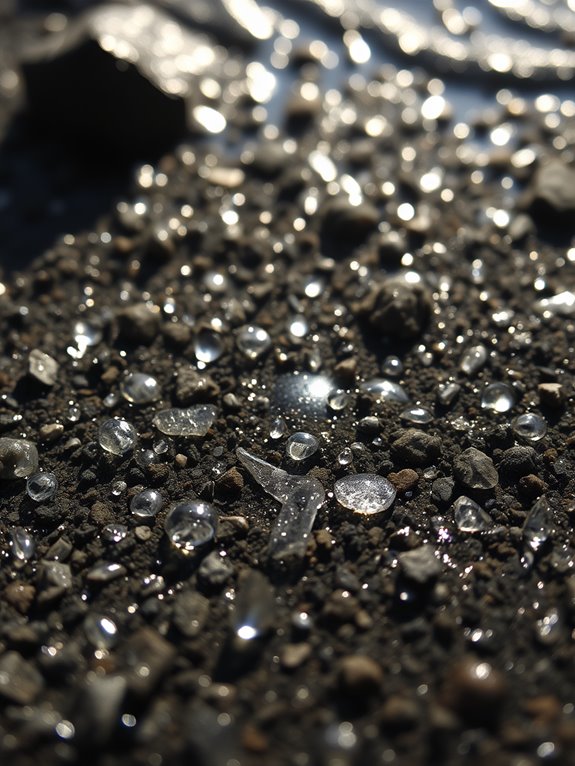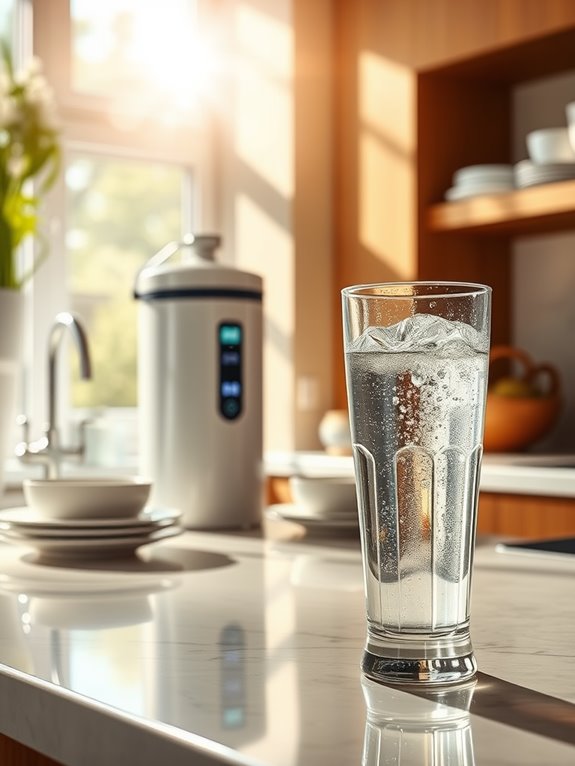Are Water Softener Systems Worth It? Pros, Cons, and Real-Life Reviews
Water softener systems can be worth it if you’re struggling with hard water problems. They help reduce scale buildup in pipes and appliances, keep your laundry looking bright, and leave your skin and hair feeling softer. However, installation costs can be high, and ongoing maintenance is necessary. Some users report issues like salty taste and increased water bills. To weigh the pros and cons, you might want to explore real-life reviews and experiences further.
Understanding Hard Water and Its Effects

Although hard water might seem harmless, it can cause significant issues in your home. The high mineral content, particularly calcium and magnesium, leads to scale build-up in pipes and appliances.
You might notice reduced water flow or inefficient heating, which can increase energy bills. Hard water also impacts your laundry, leaving clothes feeling stiff and looking dull.
Your skin and hair can suffer too, feeling dry and less vibrant after washing. Over time, these effects can damage fixtures and appliances, leading to costly repairs.
Understanding hard water’s impact is essential for maintaining your home’s efficiency and comfort.
Benefits of Installing a Water Softener
When you install a water softener, you can enjoy numerous benefits that enhance your home’s comfort and efficiency.
Softened water reduces scale buildup in your pipes and appliances, extending their lifespan and improving performance. You’ll notice cleaner dishes, brighter laundry, and softer skin and hair after washing.
Additionally, using less soap and detergent helps save you money over time. Your home’s surfaces, such as faucets and showerheads, will stay cleaner with less hard water stains.
Plus, a water softener can improve the taste of your drinking water, making hydration more enjoyable.
Here’s another post you might find useful: Why Are Plumbing Services Expensive? Unveiling the Real Costs
Potential Drawbacks of Water Softener Systems

While water softener systems offer many benefits, they also come with some drawbacks you should consider.
The initial installation costs can be high, and ongoing maintenance requires your attention and resources.
Additionally, there are environmental impact concerns that you might want to explore before making a decision.
Don’t miss out on related tips: Read this next: Is the Water Plumbed to Your Laundry Sink Potable?
Initial Installation Costs
Installing a water softener system can be a significant financial commitment. Depending on the type of system you choose, costs can range from a few hundred to several thousand dollars.
You’ll need to factor in both the unit price and installation fees, which can vary based on complexity and labor. If you opt for a professional installation, you might face additional expenses that could strain your budget.
While the long-term benefits may outweigh these initial costs, it’s essential to assess your finances and consider whether the investment aligns with your specific needs before making a decision.
Ongoing Maintenance Requirements
Although water softener systems can considerably improve water quality, they come with ongoing maintenance requirements that might be a drawback for some homeowners.
You’ll need to stay on top of various tasks to keep your system running effectively. Here are a few key maintenance tasks you should consider:
- Salt Replacement: Regularly check and refill the salt in the brine tank.
- System Cleaning: Periodically clean the resin tank and other components.
- Filter Changes: Replace filters as needed to guarantee peak performance.
- Professional Servicing: Schedule annual check-ups with a technician for thorough inspections.
These tasks can add to your overall upkeep efforts.
Environmental Impact Concerns
As you consider installing a water softener system, it’s essential to weigh its environmental impact.
While these systems improve water quality, they often discharge salt brine, which can harm local ecosystems if not managed properly. Excess sodium can contaminate groundwater and affect plant life.
Additionally, the energy and resources used for manufacturing and operating these units can contribute to your overall carbon footprint.
If you’re concerned about sustainability, look for environmentally friendly alternatives, such as salt-free systems.
Evaluating these factors will help you make a more informed decision about whether a water softener is right for you.
There’s more to explore! Here’s another valuable read: Are Hot Water Systems Electric? Exploring Different Water Heating Methods
Different Types of Water Softener Systems
When it comes to water softener systems, you have several options to choose from, each designed to tackle hard water issues effectively.
Here are four common types:
- Ion Exchange Softeners: These use resin beads to replace hard minerals with sodium ions.
- Salt-Free Systems: They condition water without salt but don’t fully soften it.
- Dual-Tank Softeners: These guarantee continuous soft water supply by using two tanks.
- Magnetic Softeners: They claim to alter mineral properties using magnetic fields, though effectiveness varies.
Each option has its pros and cons, so choose wisely based on your needs!
There’s more to explore! Here’s another valuable read: Are Water Filtration Systems Necessary? Benefits and Considerations
Cost Analysis: Water Softener Installation and Maintenance

Choosing the right water softener system involves not just understanding the types available but also considering the costs associated with installation and maintenance.
Installation costs can range from $400 to $2,500, depending on complexity and system type. You’ll also need to factor in ongoing maintenance, including salt replenishment, which can add up to $100 annually.
Regular servicing may cost around $150 to $300 every few years.
It’s crucial to evaluate these expenses against your budget and potential savings on plumbing repairs and appliance longevity.
Ultimately, weighing these costs will help you decide if a water softener is worth the investment.
Here’s another post you might find useful: Are Water Filtration Systems Tax Deductible? Here’s the Answer
Real-Life Experiences: User Reviews and Testimonials
When considering a water softener, hearing from real users can be invaluable.
Many folks share positive experiences, highlighting improved water quality and reduced soap usage, while others point out common issues they faced.
These testimonials can give you a clearer picture of what to expect.
Positive User Experiences
Many homeowners have discovered the transformative benefits of water softener systems, sharing their experiences with remarkable enthusiasm.
They often highlight how these systems have improved their daily lives, making chores easier and more efficient.
Here are some common praises:
- Softer skin and hair after showers, reducing dryness.
- Cleaner dishes and glassware, free from spots and streaks.
- Longer-lasting appliances, as scale buildup is minimized.
- Reduced laundry detergent usage, saving money and enhancing fabric life.
These positive experiences illustrate how water softeners can greatly enhance your home environment, making them a worthwhile investment for many.
Common Issues Encountered
While the benefits of water softener systems are often celebrated, some users have encountered challenges that can impact their experience. You might find issues like salty taste in the water, especially if the softener’s settings aren’t adjusted correctly.
Maintenance can also be a hassle; resin beads may need replacement, and salt levels require regular monitoring. Some have reported increased water bills due to regeneration cycles.
Additionally, if you have a lot of iron in your water, it can clog the system. Overall, while many enjoy the advantages, you should be aware of these potential drawbacks before investing.
Making the Decision: Is a Water Softener Right for You?

Are you tired of dealing with hard water issues in your home?
Deciding whether a water softener is right for you involves weighing the benefits against your specific needs.
Consider these factors:
- Water Quality: Do you notice scale buildup or dry skin?
- Appliance Longevity: Are your appliances frequently needing repairs?
- Cost: Can you budget for installation and maintenance?
- Health: Do you or your family members have sensitivities to minerals?
If these points resonate with you, investing in a water softener might be a smart choice to enhance your quality of life.
Conclusion
As you weigh the pros and cons of a water softener, visualize this: crystal-clear water flowing from your tap, skin free from the harshness of hard minerals, and appliances lasting longer. Yet, imagine the costs and maintenance lurking in the shadows. Will the benefits outweigh the drawbacks for your home? Take a moment to reflect on your unique situation and envision the difference it could make. The decision is yours, and it could change everything.


